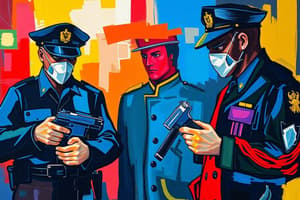Podcast
Questions and Answers
Who is known as the Father of Modern Criminology in France?
Who is known as the Father of Modern Criminology in France?
- Sir Robert Peel
- Allan Pinkerton
- Eugene Vidocq
- Alphonse Bertillon (correct)
Which detective is associated with the memorable principle 'The Police are the Public and the Public are the Police'?
Which detective is associated with the memorable principle 'The Police are the Public and the Public are the Police'?
- Sir Robert Peel (correct)
- Dr. Hans Gross
- Thomas Byrnes
- Kate Wayne
Who is considered the creator of the field of Criminalistic and the father of Criminal Investigation?
Who is considered the creator of the field of Criminalistic and the father of Criminal Investigation?
- Paul Leland Kirk
- Dr. Hans Gross (correct)
- Dr. Alec John Jeffreys
- Flaviano Guerrero
Which detective introduced the method known as 'modus operandi' or method of operation for criminal investigation?
Which detective introduced the method known as 'modus operandi' or method of operation for criminal investigation?
Who pioneered the technique of blood splatter analysis known as 'blood stain pattern analysis'?
Who pioneered the technique of blood splatter analysis known as 'blood stain pattern analysis'?
Who is known for establishing the system of 'Mutual Pledge' for social control?
Who is known for establishing the system of 'Mutual Pledge' for social control?
Which pioneer in criminal investigation popularized the idea of 'employing a thief to catch a thief'?
Which pioneer in criminal investigation popularized the idea of 'employing a thief to catch a thief'?
Which pioneer was famous as 'The Blind Beak'?
Which pioneer was famous as 'The Blind Beak'?
Which pioneer implemented the LEX TALIONES principle in law enforcement?
Which pioneer implemented the LEX TALIONES principle in law enforcement?
Who was known for grouping ten persons together in 'Tithings' for mutual protection and shared responsibility?
Who was known for grouping ten persons together in 'Tithings' for mutual protection and shared responsibility?
Flashcards are hidden until you start studying
Study Notes
Pioneers in Criminal Investigation
- King Hammurabi, the King of Babylon, created one of the first written laws, the Code of Hammurabi, which implemented the principle of "Lex Talionis" or "an eye for an eye and a tooth for a tooth" to punish offenders.
Alfred the Great's Contributions
- Established the system of "Mutual Pledge" or social control, which organized the country into several levels for security.
- Introduced the "Ten Tithing" system, where a group of 100 people were under the charge of a High Constable, who dealt with serious breaches of the law.
- Introduced the "Tithing" system, where ten people were grouped together to protect one another and assume responsibility for each other's actions.
Jonathan Wild's Contributions
- Became London's most effective criminal investigator by employing a thief to catch a thief.
- Conceived the idea of charging a fee for locating and returning stolen property to its rightful owners.
John Fielding's Contributions
- Introduced the practice of developing informants and printing wanted notices.
- Employed criminal raids and used firearms and handcuffs.
- Could recognize 3,000 criminals by the sound of their voices.
Eugene François Vidocq's Contributions
- Established a squad of ex-convicts to aid Paris police in investigations.
- Worked under the theory of "employing a thief to catch a thief".
- Founded LA SURETE, France's national detective organization, and is considered the "Father of Modern Criminology in France".
Sir Robert Peel's Contributions
- Established the London Metropolitan Police, the world's first modern organized police force.
- Introduced techniques such as detectives concealing themselves, secretly photographing and recording conversations.
- Believed in the principle "The Police are the Public and the Public are the Police".
Allan Pinkerton's Contributions
- Became the first detective of the Chicago Police Department in 1849.
- Opened a private detective agency in the early 1850s, which became successful and formed the North-Western Police Agency.
Kate Warne's Contributions
- Became the first female detective in history, hired by Pinkerton Agency.
Dr. Hans Gross's Contributions
- Believed to be the creator of the field of Criminalistics and is considered the "father of Criminal Investigation".
Thomas Byrnes' Contributions
- Trained his detectives in recognizing individual criminal techniques, later known as "modus operandi" or method of operation.
Paul Leland Kirk's Contributions
- Pioneered blood splatter analysis or "blood stain pattern analysis".
Dr. Alec John Jeffreys' Contributions
- Invented the use of DNA fingerprinting or profiling, which was used to identify Colin Pitchfork as a murderer in England.
Alphonse Bertillon's Contributions
- Introduced the first systematic system based on anthropological measurement.
- Considered the "founder of Criminal Investigation" and the "father of Personal Identification".
Flaviano Guerrero's Contributions
- Became the only Filipino member of the United States Federal Bureau of Investigation (FBI).
Studying That Suits You
Use AI to generate personalized quizzes and flashcards to suit your learning preferences.




